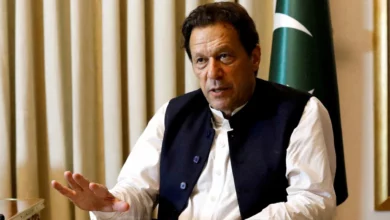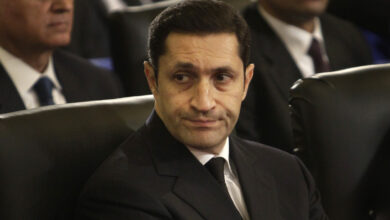
Judge Ahmed Refaat’s decision last Tuesday to grant former President Hosni Mubarak’s legal team a month to prepare its final remarks ended speculation that a ruling against the former president was imminent. Some believed the ruling would be issued before January 25 in order to counter plans for demonstrations on the anniversary of the start of the revolution.
This most recent unexpected turn in the trial left many wondering whether the evidence presented by the prosecution and the civil rights lawyers last week is enough to lead to a ruling against Mubarak.
While some lawyers are concerned that the case against the former president is weak, other legal experts are confident that Mubarak will be convicted.
A death sentence?
Concluding a historic three-day presentation of the case, the prosecutor requested the death penalty last week for the former president, his former Interior Minister Habib al-Adly and six of Adly’s assistants, for conspiring to commit premeditated murder and attempting to murder protesters in January.
Judge Ahmed Mekky says that acquitting Mubarak is “almost impossible,” and instead expects that the former president will get 10 to 25 years in prison. Mekky says that the evidence is not enough to obtain a death sentence.
“The death sentence requires proof of premeditation, and I haven’t seen anything that proves that in what has been said. There is evidence of murder, the maximum sentence for which is life sentence,” says Mekky.
Laying out his evidence in court last week, the prosecutor presented autopsy reports to prove that protesters were killed between 28 and 31 January with live ammunition. He then used visual evidence and eyewitness accounts to prove that they were killed by police.
The prosecution’s case has become weaker as it tries to link the killings to the officials on trial.
The prosecutor depends on the testimony of officers who allegedly heard conversations between the former minister of interior and his assistants. In those conversations, the former minister allegedly told his assistants to use all means necessary to stop the protesters. The officers also allege they witnessed the arming of ground forces with automatic weapons.
As for Mubarak, no solid evidence or eyewitness account connects him to the killings, leaving the prosecution with only deductive evidence to implicate the former president.
The prosecutor cited the two former ministers of interior who came after Adly. They testified that orders to open fire on protesters could only come from the head of state.
Mekky says that the prosecution does not have to prove that Mubarak ordered the killings in order to convict him of murder. Due to his responsibility as the head of state to protect citizens, Mekky says that proving that Mubarak was aware of the killings is enough for a conviction.
“If it was proved that he knew about the use of live bullets while he has a legal obligation to protect the citizens from being killed, this is enough to convict him of murder,” says Mekky.
In order to prove Mubarak’s awareness of the events, the prosecution is relying on Adly’s testimony that he briefed the former president about the events. The prosecution is also relying on Mubarak’s speech the night of 28 January, in which he said that the police were following orders to protect protesters.
If Mubarak’s defense team was able to prove that he wasn’t aware of the killings, Mekky says that Mubarak would still not be exempted of accountability and could receive a 10-year prison sentence for breaching his duties as president.
Despite the difficulties faced by the prosecution, Judge Zaghloul al-Balshy says that a strong ruling against Mubarak remains possible because the criminal court relies on the judge’s beliefs more than it does on evidence.
“The judge is free to form his conviction based on any evidence he has, whether it was material or verbal. He can even choose to form his judgment based on one eyewitness,” says Balshy.
Amir Salem, a civil rights lawyer representing some of the victims’ families in the case, expects the former interior minister to receive the death sentence, thereby allowing Mubarak to get off with a lighter sentence.
Evidence shortage
The prosecution has a tough job, as the most important evidence is in the possession of the security apparatus that he used to head and whose loyalties are unclear.
Since the start of the trial, the prosecution has struggled and often failed to obtain vital evidence in the case. In his final remarks, the prosecutor complained of the lack of cooperation from state institutions in providing it with evidence
Many have complained that the start of the case, six months after Mubarak stepped down, gave plenty of time for his supporters, who are still in office, to destroy evidence.
Earlier in the case, head of central security communications Hussein Moussa was sentenced to two years in prison for destroying audio recordings of conversations between Adly and his assistants in the ministry’s operation room during the days of the uprising. The recordings are believed to have included orders to shoot protesters.
Leaks of Field Marshal Mohamed Hussein Tantawi’s testimony in September, which many hoped would constitute the strongest evidence in the case, were disappointing. According to lawyers who attended the session, Tantawi denied that Mubarak had ordered the military to open fire on protesters, despite previous statements by the military ruling council saying that the military had refused to carry out orders to kill protesters.
Civil rights lawyers were astonished when video evidence presented by the intelligence services contained videos starting from 1 February, which is not the period when the events examined in the trial took place.
Another cause for concern arose when the prosecution said it was unable to identify who carried out the killing of protesters.
However, Mohamed Abdel Aziz, a civil rights lawyer representing victims’ families in the case, dismisses such concerns. “The conviction of the one who carried out the crime is not necessary for the conviction of the instigators, as long as there is an ongoing investigation,” he says.
Political versus legal
In the trial of a man who ruled the country for 30 years and was forced out of power by a popular uprising, politics are bound to interfere. But some are worried that the prosecution is counting too much on political resentment and neglecting to build a strong case based in law.
“The prosecutor’s speech was political and a public opinion pleaser, but legally it doesn’t add anything to the case,” says human rights lawyer Gamal Eid.
In the first day of the prosecutor’s remarks, prosecutor Mostafa Suleiman gave a resonant speech where he praised the revolution that brought Mubarak down and dug into the corruption of the deposed president’s 30 years in power.
Suleiman accused Mubarak of corrupting political life in Egypt, and forging the people’s will by rigging elections. He also accused him of oppressing anyone that challenged his rule, clearing the way for his son Gamal to become president, and of halting development in Egypt as a whole.
While the prosecutor’s speech encompassed all fallen president’s wrongdoings in past years, the charges against Mubarak only hold him accountable for a handful of incidents of financial corruption and the killing of protesters in January.
Eid explains that the contradiction between the strength of the case’s political side and the weakness of its criminal one is the result of a tradition inculcated in the prosecution throughout Mubarak’s reign: to pay more attention to political than legal concerns.
Even though he acknowledges that political pressure for a fast verdict denied time to the prosecution to perform its work properly, Eid says that the prosecution should be held accountable for failing to build a strong case against Mubarak.
Eid says that according to Egyptian law, the prosecution could have turned some of its political accusations against Mubarak into legal charges. He also accuses the prosecution of neglecting to collect important evidence in the case.
Three cases in one
In the same case that Mubarak, Adly and his aids are being prosecuted for killing protesters, the former president, along with other defendants, is also facing charges of squandering public funds.
Legal experts and lawyers in the case complain that the decision to combine unrelated charges into one case is causing unnecessary complications.
Mubarak, his two sons and businessman Hussein Salem, who is currently imprisoned in Spain, are facing charges of bribery and abusing power. The prosecution accuses Mubarak and his sons of accepting five villas in Sharm el-Sheikh from Salem in return for selling him state land in Sharm el-Sheikh for a fraction of its value. The prosecution also accuses Mubarak of hiding foreign grants to the Library of Alexandria in a bank account that only he can access.
In the third crime alleged in the case, Mubarak and Salem face charges of squandering public funds. The allegation is based on evidence that Mubarak directly assigned Salem’s company the privilege of exporting gas to Israel, instead of holding an auction as the law requires. The allegation is also based on the deal’s contract, which obligates Egypt to sell its gas to Israel at sub-standard prices and does not give it the right to modify the contract.
According to Abdel Aziz, the court rejected lawyers’ request that the charges relating to the squandering of public funds and the export of gas to Israel be heard in a separate trial. The allegations concerning the gas and squandering of public funds require different evidence and witnesses than the allegations concerning protester deaths.
“This is a big mistake since the beginning. I don’t know whether it was intentional or not, but it has caused unnecessary detours in the case,” says Salem, who is also against the decision.
Judge Balshy is critical of the move, but trusts that it will not get in the way of a just ruling.
“This creates a burden on the court but it is not a legal flaw. It is neither justified nor harmful, and each defendant will be judged based on the charges he faces,” says Balshy.
Partners in crime acquitted
If the cases of officers accused of killing protesters is an indication of whether Mubarak, Adly and the other Interior Ministry officials will be convicted, observers are not optimistic.
Only one low ranking police officer was sentenced to death in absentia in June for killing protesters. Last week, four police officers were acquitted of charges they killed protesters outside of Sayeda Zeinab police station. Officers accused of killing protesters in Suez were released on bail Thursday.
However, lawyers in Mubarak’s case are confident that the trials and verdicts of the officers will not affect their case. The prosecutor clarified to the court that the victims listed in Mubarak’s trial do not include those killed in front of police stations. All the officers on trial are being tried for killing protesters outside police stations, while those who carried out the killings remain unknown.
Balshy agrees that the Sayeda Zeinab verdict will have no bearing on Mubarak’s trial, clarifying that the ruling in a case is left entirely up to the judge regardless of rulings in similar cases as long as they are issued from courts of the same level.
Balshy says, however, that the officers should have been tried in the same case with Mubarak as they are partners in the same crime.




